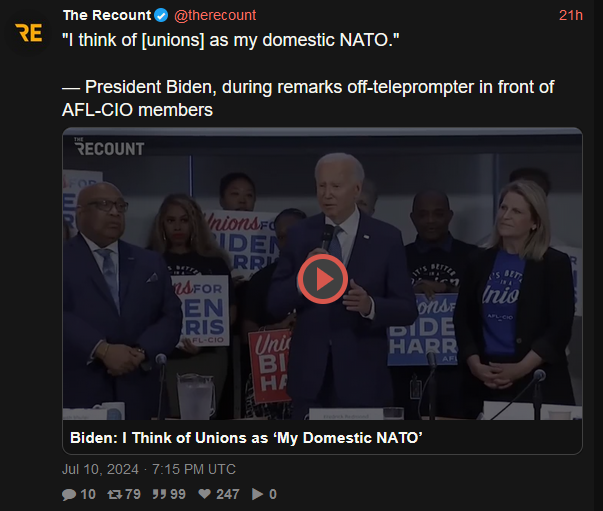‘We're unionizing because we love CounterPulse,’ technician Jessi Barber said before the vote.
By Lily Janiak, Theater criticJune 26, 2024
CounterPulse workers held a March on the Boss near their venue in San Francisco's Tenderloin neighborhood on June 4.
Workers at performance art company CounterPulse voted unanimously to unionize — a history-making move in an industry where few office staff are organized.
The 19 employees, occupying roles from administrative staff to technicians to a drum circle instructor, have been dues-paying members of the Industrial Workers of the World since June 4. The vote on Tuesday, June 25, which was certified by the National Labor Relations Board, secures them official recognition from management and means “the employer must begin bargaining in good faith with the union,” NLRB press secretary Kayla Blado told the Chronicle. Both parties have five business days to challenge the result.
CounterPulse workers gather during a June 4 March on the Boss. They voted to unionize Tuesday, a move that the National Labor Relations Board has certified. Dylan Brown/CounterPulse Workers United
“We feel like an exemplary arts org, especially here in San Francisco,” CounterPulse house manager Lonnie Taylor said at the Tenderloin venue minutes before casting her vote. Unionization, she added, marks yet another case of “us doing something that hasn’t been done.”
A June 4 letter notifying Artistic and Executive Director Julie Phelps and the Board of Directors of their joining the IWW echoed those sentiments.
“For too long, the hierarchical structure of CounterPulse has stood in opposition to the art that finds home in our pink building,” the workers wrote, referring to the company’s risk-taking and boundary-blurring output that might feature everything from a game show that tasks the audience with designing a utopia to a dance performance staged in total darkness to affectless but agreeable weirdness involving time machines and shadow puppetry.
Phelps said she was inspired by the workers, adding, “I believe the union holds unique potential to collectivize and share power toward creating more sustainable nonprofit workplaces.”
Board Chair Victor Cordon also expressed support and a commitment to collaborate.
“We are excited by what this process can mean for actualizing new models of nonprofit leadership and for CounterPulse to be part of an important movement at the forefront of reimagining a thriving nonprofit workforce,” he said.
Julie Phelps sits for a portrait at CounterPulse’s building in San Francisco on March 3, 2023.
The letter also made demands for a nonhierarchical structure and collective decision making on staffing issues; union representation on the board of directors and in artistic programming; the company’s full commitment to the boycott, divestment and sanctions movement; and improvements in pay and benefits.
“We’re unionizing because we love CounterPulse, and we believe in the work CounterPulse does, and we want CounterPulse to always exist,” technician Jessi Barber declared before Tuesday’s vote, noting that she’s worked at many other arts organizations where progress on issues such as racial equity evaporates once a committed staff member departs. Unionizing, by contrast, creates a sturdier framework, “furthering the mission, operationalizing the mission,” she said.
Katherine Neumann dances during Charles Slender-White’s “Split,” a 15-minute and one-on-one experience by Fact/SF at CounterPulse on Sept. 7, 2021. Scott Strazzante/The Chronicle
Many theater workers at large companies such as BroadwaySF and the American Conservatory Theater have union contracts through trade-specific rather than venue-specific associations, covering thousands nationwide. For instance, Actors’ Equity Association represents actors and stage managers, while various sister unions cover stagehands and technicians, directors and choreographers, and scenic artists. But no nationwide theater trade union exists, for example, for the administrative staff who want to organize at CounterPulse.
The company’s election could prove a model for other performing arts workers seeking better contracts amid successive waves of labor unrest throughout the country. It might also serve as an alternative to the distributive or collective leadership model many theater companies in the Bay Area have adopted in recent years, partly to address concerns similar to those expressed by CounterPulse workers.
“Are: era” by Psueda at CounterPulse on April 13, 2021, in San Francisco. The art installation allowed pods of up to four audience members at a time inside as part of Combustible Residency 2021.
The vote comes after the pandemic and the racial reckoning of 2020 brought heightened scrutiny to labor conditions in the performing arts, with the We See You, White American Theatre collective and other groups publishing demands for more humane hours, salary transparency, racial equity and more. More immediately, it comes as nationwide disputes between labor and management about the Israel-Hamas war have riven even famously cushy workplaces such as Google. Taylor and Barber also cited worker organization drives at City Lights Bookstore and Peet’s Coffee as inspirations.
Prior to Tuesday, there have been two other recent successful union drives elsewhere in Bay Area arts. In March, employees at the Oakland Museum of California voted to organize, followed the next month by 34 workers at 50-year-old Creative Growth, the studio and gallery for artists with disabilities. Both Oakland shops unionized through the American Federation of State, County and Municipal Employees Cultural Workers United.
Sher-ron Freeman wears her own design during the Beyond Trend Runway event at the Oakland Scottish Rite Center on April 27, 2019. The event by Creative Growth featured the work of artists with developmental, mental and physical disabilities.
Creative Growth United member Sam Lefebvre cited a number of factors that last summer led him and his peers to start discussing the possibility of organizing, including “an overreliance on low-paid contractors and volunteer labor” with the prospect of stabler employment dangled only after a certain period of paying dues.
“I think that’s really typical of employers in the arts,” Lefebvre said. “They expect the prestige or access of working in an arts organization to compensate for low pay.
“Our workplace, like museums and other arts institutions around the country, agrees that you can’t eat prestige.”
Creative Growth Interim Executive Director Tom di Maria said the unionization “reflects our collective commitment to fostering an open, respectful, and supportive work environment.”
Audience members gather before “The Hands That Feed You” event at CounterPulse on Oct. 6, 2023. Noah Berger/Special to The Chronicle
While the long-standing American image of a union member is of a blue-collar worker at a large industrial company, John Logan, chair of the Labor and Employment Studies Department at San Francisco State University, said, “That is beginning to change.”
Cultural workers, he noted, fit the nationwide profile of young, college-educated and low-paid laborers whose interest in organizing was bubbling before — and then was accelerated by — the pandemic. Such workers are less interested in labor behemoths such as the AFL-CIO and more “attracted to the idea of being able to organize your own workplace, organize your co-workers,” he said. They’re also less likely to advocate for traditional union sticking points such as pensions, instead focusing on “cultural issues” such as “diversity in the workplace.”
Will Caldwell as Gene Goo, left, and Julie Phelps as Captain Phelps in CounterPulse’s “How We Spend Our Days.”
“These are workers who entered the paid workforce for the most part after the Great Recession of 2008,” he went on, explaining the shift in labor priorities as generational. “They’ve only ever known precarious employment situations.” Partly as a result of Black Lives Matter movement and campaigns for LGBTQ rights and abortion rights, “They tend to be more skeptical about the more brutal side of U.S. capitalism.”
Then the pandemic spurred workers further.
“They were working often for multibillion-dollar corporations who really didn’t appear to care that much if they lived or died,” he said.
Editor’s note: This story has been updated to include responses from CounterPulse’s leadership.
 god damn the 21st century sucks
god damn the 21st century sucks
 unions can now do gladio-style operations, confirmed.
unions can now do gladio-style operations, confirmed.
